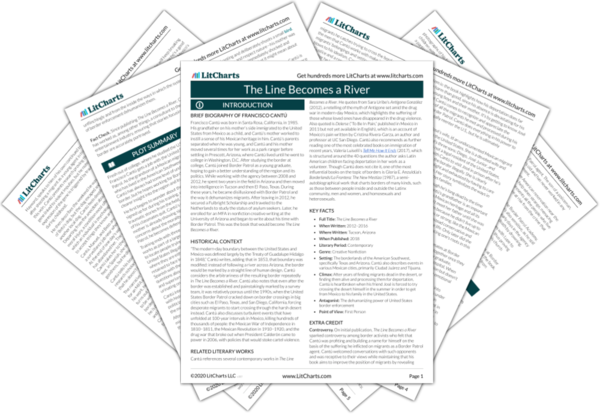The desert landscape of the Southwestern United States forms a majestic backdrop to Cantú’s life and work in Border Patrol. As the son of a former park ranger, Cantú appreciates and respects nature instinctively, and he pays close attention to the creatures and plants that surround him. Yet as his work with Border Patrol progresses, he witnesses and participates in acts that defile nature, and he finds his own connection with it growing complicated: sometimes, while looking at the desert, he can see only the horrors that have occurred there. After he leaves Border Patrol, his ability to appreciate natural beauty returns. In this way, Cantú argues that nature humanizes people, and that the loss of respect for nature and its beauty can signal a loss of appreciation for others’ humanity.
The Line Becomes a River is peppered with acts of defilement of nature, each of them coming to represent Cantú’s fears about what he or other humans are capable of. In his early days as a border agent, Cantú is out with a group of fellow agents when their superior sets fire to a cholla cactus. The men stand around watching it burn and laughing. Immediately after, the superior warns them to walk with their guns drawn because there’s a mountain lion nearby, and Cantú feels “a profound and immediate fear—not of the danger posed to us by the animal, but of the idea that it might show itself to us, so many men armed and heedless.” He’s scared not of the animal but of what his coworkers might do to it given what they did to the cactus. Appearing near the beginning of his employment, this moment of disharmony with nature is an early signal of the loss of empathy and skewed moral perspective Cantú will struggle with during his time as an agent. Later, at a particularly stressful moment in his work, when Cantú feels helplessly trapped in the broken system of border enforcement, he visits a firing range. While he’s practicing his target shooting, a small yellow bird lands above his target, and he impulsively shoots it. Immediately, he reports, “I began to feel sick and I wondered, for one brief moment, if I was going insane.” The strength of this response indicates that to Cantú, his knee-jerk reaction to kill the bird signifies a deep darkness in his psyche.
Cantú’s mother is opposed to her son’s work as a Border Patrol agent, often trying to point out to him the psychological damage it could do him. By emphasizing his mother’s connection to nature, for instance by highlighting her work as a park ranger, Cantú cements the book’s link between empathy and the appreciation of nature. In the prologue, Cantú asks his mother why she joined the National Park Service, and she replies: “Because the wildlands were a place where I could understand myself.” The answer ties the complexity of humans to the complexity of the natural environment, suggesting that to appreciate one is to appreciate the other. While struggling with his conscience after leaving Border Patrol, Cantú talks to his mother, who tells him a story from her youth of trying to rescue a ground squirrel from being fed to a snake—but then having to kill it after it dies in her care. In this way, she explicitly links the violence and callousness Cantú has been part of during his time in Border Patrol with the act of defiling nature by killing an animal: both acts are well-intentioned but ultimately violent.
In the epilogue, Cantú tenderly paints a beautiful scene from nature, ending the book with an indication that, after leaving Border Patrol, he is learning to reconnect with his empathy and full humanity. In the final line of the epilogue, Cantú writes, “All around me the landscape trembled and breathed as one.” Here, “as one” implies the infinite interconnectedness of every element of nature. During his time in Border Patrol, Cantú found complexity and interconnection to be suffocating, because he was trapped in a human web of suffering. Now, having escaped that human system and regained his connection to nature, he remembers that the interconnectedness of all beings in its pure, natural form is beautiful and almost holy. This natural scene takes place on the Rio Grande, the river that separates Texas from Mexico. By ending the book at a natural border, Cantú implies that nature, in all its regenerative and connected complexity, will hold the key to resolving the border problem and all the suffering it has inflicted.
Nature, Beauty, and Humanity ThemeTracker

Nature, Beauty, and Humanity Quotes in The Line Becomes a River
Dragonflies migrate as birds do, she told me, beating their papery wings for days on end across rolling plains, across long mountain chains, across the open sea.

Unlock explanations and citation info for this and every other The Line Becomes a River quote.
Plus so much more...
Get LitCharts A+I dropped the little bird with one shot.
My uncle began to recount all the natural things he had been made to destroy in the years he worked as a contractor in Santa Fe. At one job site he tore down a mighty pine tree and cut it into pieces. […] It’s overwhelming sometimes, he said, to think of all the trees I’ve killed, all the scars I’ve left in the land.











